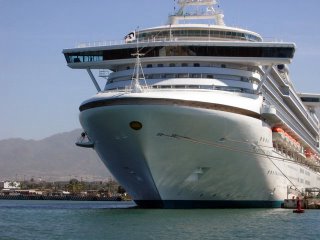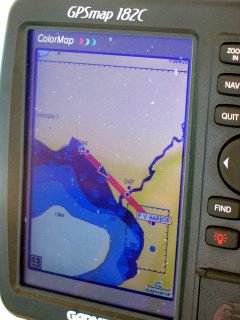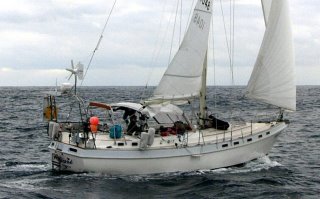




Here are some smile shots of Molly, and Emily in the snow. Hope you enjoy.
Joe
Welcome to Vagari’s 7th winter of sailing. We have put 8,000 miles under Vagari’s keel during those cruises but this year like last year won’t be a high mileage year. We just don’t have the lust for the long cruises that we did when we started cruising but we still enjoy living on board and sailing near our homeport. Welcome aboard! We hope you enjoy our blog. Your comments, questions and suggestions are appreciated and encouraged.



We spent a day in the busy Mazatlan commercial harbor. I walked up to the lighthouse at the harbor mouth, which is almost 500 feet above sea level. The view was worth the climb.
Lots of ships coming and going, container ships, oil tankers, ferries, a cruise ship and all types of fishing and tourist boats.
Our next stop was Isla Isabel, which has been a Mexican nature preserve for 25 years. The island is about 30 miles off the mainland coast and an overnight sail southeast from Mazatlan.
The pictures tell the story.
We anchored on the east side of the island. We were exposed to any winds/seas except from the Southwest thru Northwest. Cruisers call this a “fools anchorage” because it’s really not protected. On top of that the bottom was a rock self with a few inches of sand on top of the rock plus large rocks all around just waiting to seize you anchor. The water was warm and clear. We could see our anchor sitting on top of the sand when snorkeling. The snorkeling was almost as interesting as the hiking on the island.
The lack of a protected anchorage reduces the number of visitors. We listened to the weather forecast morning and evening to make sure we didn’t get caught in a situation where the wind could blow us onto the rock cliffs or beach. We left after two days knowing we might never be lucky enough to catch such a favorable weather window again.
San Blas, our next stop, was founded in 1535 but not developed as a port until 1768. Some of the ships that were used to explore the North American West Coast were built here. The infamous pirate Clipperton was captured and hung in San Blas.
We took a commercial two-hour boat ride up a jungle river just outside town. The pictures tell that story.
We wanted to take a bus from our anchorage into town, but learned that they only run on the weekend. So we started walking. Six kilometers from town a gentlemen offered us a ride in the back of his pickup. Yes kids, your mom was happy to jump into the back of the pickup and away we went.
The trip from San Blas to Banderas Bay (Puerto Vallarta area) took almost nine hours. We caught and ate a hefty Dorado and saw countless whales. One time we saw three huge Humpback whales leaping out of the water. At different times at night both of us heard but could not see, because of the darkness, whales breathing. There was a heavy overcast that day caused by clouds going northeast from the Inter Tropical Convergent Zone near the equator to cooler northern areas. We often get high clouds from that process but heavy overcast is unusual.
